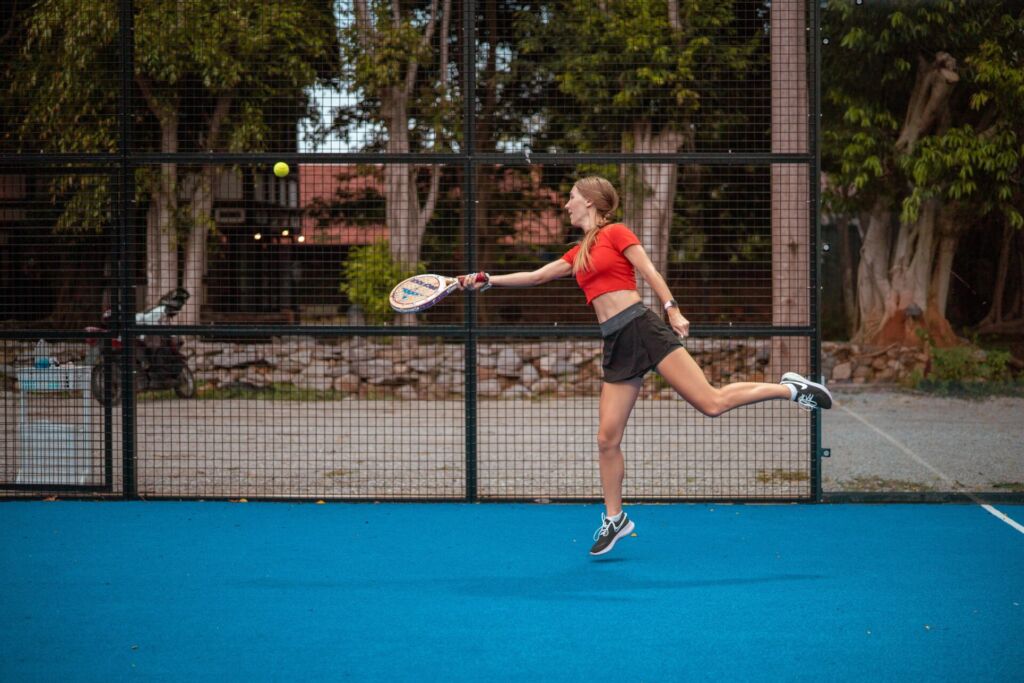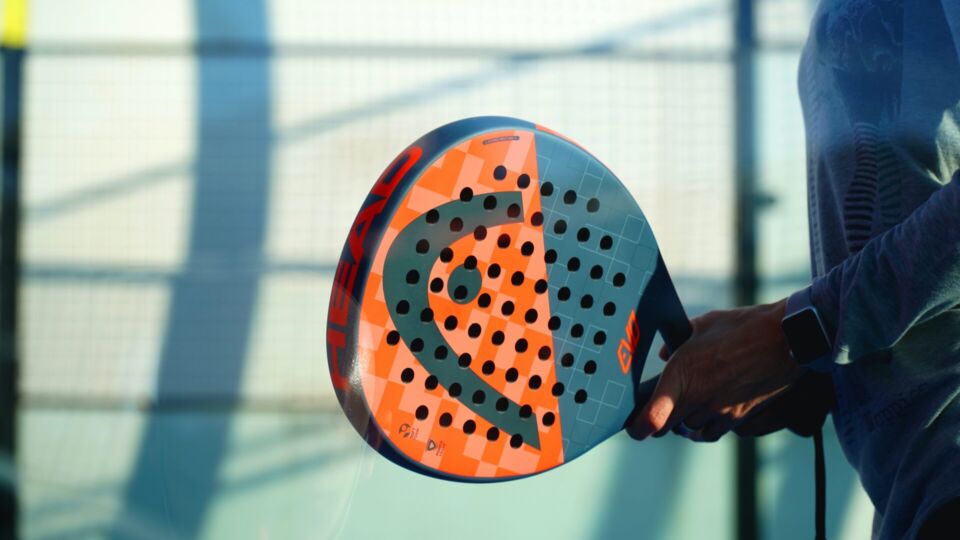Don’t let her looks deceive you.
Tennis aficionada Kumiko Fukushima, 62, is only 159 cm (5’2″) tall yet she can give you trouble with her finesse and understanding of the geometry of the court.
The retired Japanese lady, who has been living in Bali for more than three decades and regularly organizes intermediate level doubles events, told Coconuts Bali that she has been playing tennis for about 20 years.
For the past six months, however, another racket sport piqued Fukushima’s interest: padel.
A sizzling sensation in racket sports, padel is what happens where tennis meets the thrill of squash in a uniquely enclosed court. Picture this: a fast-paced game of doubles (the game is only played in doubles), players ricocheting shots off walls, and the ball never going out of bounds.
It’s an exhilarating blend of strategy, finesse, and outright fun.
Padel has gained popularity in recent years, particularly in Europe and Latin America. Known for being a social and accessible sport, as well as suitable for players of various ages and skill levels, padel has become increasingly popular on the Island of Gods as well.
“I like padel. The amount of exercise is less compared to tennis, I don’t have to use much physical strength but can still burn enough calories,” she said.
Ukrainian Dmitry Shcherbakov, who runs the Umalas and Sanur based Liga.Tennis, told Coconuts Bali that in the past five years he had seen many people come to the club, tried their hand at tennis, and never came back.
“[Tennis is] a hard sport to study, which requires hundreds of hours of practice and serious investments to pay lessons. Not everyone is ready for that or can afford it,” he said.
Padel, on the other hand, is relatively easy to play.
“Almost everyone can play padel from the first day,” Shcherbakov added. From a business perspective, padel courts are cheaper to build since they are smaller than tennis courts.
Liga.Tennis established three padel courts at their Umalas facility in December 2022 and another was added last month. Their Sanur facility currently has two padel courts, while two more are in progress.
Shcherbakov cited Italian Toni Montesanti, one of the owners of Jungle Padel in Pererenan, which was launched in early 2022, as the very person who is responsible for popularizing the novelty racket sport in Bali.
Separately, Terry Omata, one of the owners of The Island Sports Club that recently opened the first padel club in Uluwatu, believes that Bali’s first padel club opened way back in March 2021 at the Melia Resort in Nusa Dua.
Still, Omata cited Jungle Padel as the key to the sport’s current popularity.
“Jungle Padel opened a club in Pererenan, and after that, padel really took off,” Omata said.
Jungle Padel: The first of many padel centers
When Coconuts Bali interviewed Toni Montesanti, a 51-year-old Italian man who is one of the owners of Jungle Padel, he candidly mentioned that it was his wife, Elisa, 48, who indirectly triggered the idea of bringing padel to Bali.
“We had lived in London and Spain, where from tennis I fell in love with padel, before moving to Bali in March 2021 to escape the lockdowns. At that time, I actually suggested we move to Thailand because they already had padel courts, whereas Bali did not,” Toni recalled his experience.
Elisa, however, insisted that the family should make Bali their new home.
Toni came across by chance his now business partner, Staffan Seaton, who shared the same vision on padel and had knowledge of the territory, having lived in Bali for 40 years.
Noticing the growing fitness community in Canggu and recognizing that padel has been a rapidly growing sport worldwide, they decided to take a leap of faith.
After meetings with his business partners, overcoming challenges and hearing from people warning him that it would not work in Bali, construction on Jungle Padel in Pererenan began in June 2021.
“Court 1” was opened in January 2022 – and it was just a court with no roof where people were allowed to try padel for free while waiting for other courts to finish construction. Jungle Padel was officially launched on Feb. 14, 2022.
The rest, as they say, is history.
Robin Ekman, another owner of Jungle Padel, commented that the reason why padel resonated with a lot of people in Bali is because of the social aspect and the simplicity of the sport.
“A lot of people are traveling alone, moved here by themselves or with their partner/friends which means that you need to find other players to play with because padel should always be played as doubles,” he said, citing that the community is growing as many people flock to their center for socializing and networking.
“We all left our own countries, which means that a lot of us are open to meeting new people,” he added.
In Canggu, padel is notable for being popular amongst fitness influencers and Instagram models.
Jesus Viejo, a coach at Jungle Padel, mentioned that many of them kept coming back after trying the sport for the first time.
“Padel is a racket sport that is not so complicated to learn. It is not too technical and physically demanding like tennis. You don’t have to be a professional to enjoy the padel game – so it is very accessible. During the game you really have fun and after the match you drink some beers and socialize,” he said.
Montesanti shared, “The beauty of padel is that it’s for everyone. The game is incredibly fun and addictive.”

Since Jungle Padel opened, padel clubs have been popping up all over Bali, from Uluwatu to Canggu to Ubud.
In addition to the Pererenan club, Jungle Padel opened courts in Canggu two months ago and in Ubud in mid-September.
Montesanti, who now resides in Ubud with his family, noted, “People in Ubud love playing padel because they value mindfulness, and padel is a very mindful sport.”
Their future plans include opening Jungle Padel in Kerobokan in two months, Kedungu early next year, and Seseh in the middle of next year.
Jungle Padel’s swift expansion prompted other clubs to open padel facilities.
In addition to their club in Uluwatu, The Island Sports Club also plans to expand in Berawa, Cemagi and even Gili Terawangan.
“Every day, it seems like we hear about a new club opening up somewhere new in Bali,” said The Island Sports Club’s Terry Omata.
Another facility, Bali Padel Academy, is currently under construction in Canggu. Other notable clubs include IndoPadel in Denpasar and Sanur Padel Club.
Can Indonesia be the next padel powerhouse?
Spain is considered the powerhouse of padel as it is the birthplace of the sport and has a highly developed professional circuit with many world-class players. Argentina also boasts a strong padel scene and has produced some of the sport’s top talents.
Other countries like Mexico, Sweden, and Italy have been making significant strides in padel and have competitive players and active padel communities.
In Southeast Asia, it has been reported that padel is growing in Thailand, Singapore, Vietnam, and Malaysia.
Since it is a relatively new racket sport, can Indonesia take upon this opportunity to become a strong padel country?
When asked about whether Padel will also be popular amongst the locals, Robin said that he is hopeful despite badminton being the most popular racket sport in Indonesian and it is a lot more cheaper.
“I think since Indonesia has this tradition of being a racket sport country [badminton], I’m pretty sure padel can reach out to local people who want to try something new,” he added.
Badminton is, at this point, more affordable, too. One can rent a badminton court for as low as IDR45K (US$2.88) per hour in Bali. At Jungle Padel’s Canggu branch, a padel court rental starts from IDR400K (US$25.58) per hour for four players. Padel aficionados can only hope for lower prices as the sport matures in Bali and beyond.
In unison, Omata highlighted that Indonesians’ affinity for racket sports, including badminton, table tennis, and tennis, is well-known and thus the emergence of padel on the scene has drawn increasing numbers of local players.
“We have already seen a lot more Indonesians playing compared to just a year ago. It is exciting to see!” exclaims Omata.
Indonesian Padel Association (Perkumpulan Besar Padel Indonesia or PBPI) Chairman Galih Dimuntur Kartasasmita told Coconuts Bali that the association was established in June this year, highlighting the increasing popularity of the sport.
“Our task is to introduce padel at next year’s PON (The National Games) in September as an exhibition sport,” he said.
“For now, Bali is the hub for padel growth in Indonesia as it is now the most mature here [compared to other parts of Indonesia]. Since Jungle Padel was opened, the island now has at least 15 clubs with a total of 60 courts, while Jakarta currently has three courts and Banten has four courts,” he added.
Racquet Padel Club opened in Cilandak, South Jakarta, on Oct. 2, 2022 with three Padel courts, while Verde Sports Hub in Tangerang, Banten, was established about one-and-a-half years ago.
Indonesia is already a powerhouse in badminton as the shuttlers regularly score gold medals at the Olympics, while in lawn tennis the nation scored medals in the Southeast Asian Games and Asian Games.
“Indonesia has the potential to become the [padel] champion in Southeast Asia as this is a relatively new sport,” said Galih, who added that he hopes each padel club is committed to develop young athletes in their facilities so that Indonesia can produce champions – at least for the ASEAN-level.
Jungle Padel’s Montesanti quipped that they are committed to make padel a local game and not just for the expats.
“We take immense pride in having given back by training the first-ever Indonesian padel coach and forming the first-ever Indonesian padel team,” Montesanti told Coconuts Bali.
“We want to go to orphanages and local schools to find some talents and build strong Indonesian padel players in the future,” Montesanti said, adding that he wants to make padel more affordable and ensuring its popularity is the key for that.




